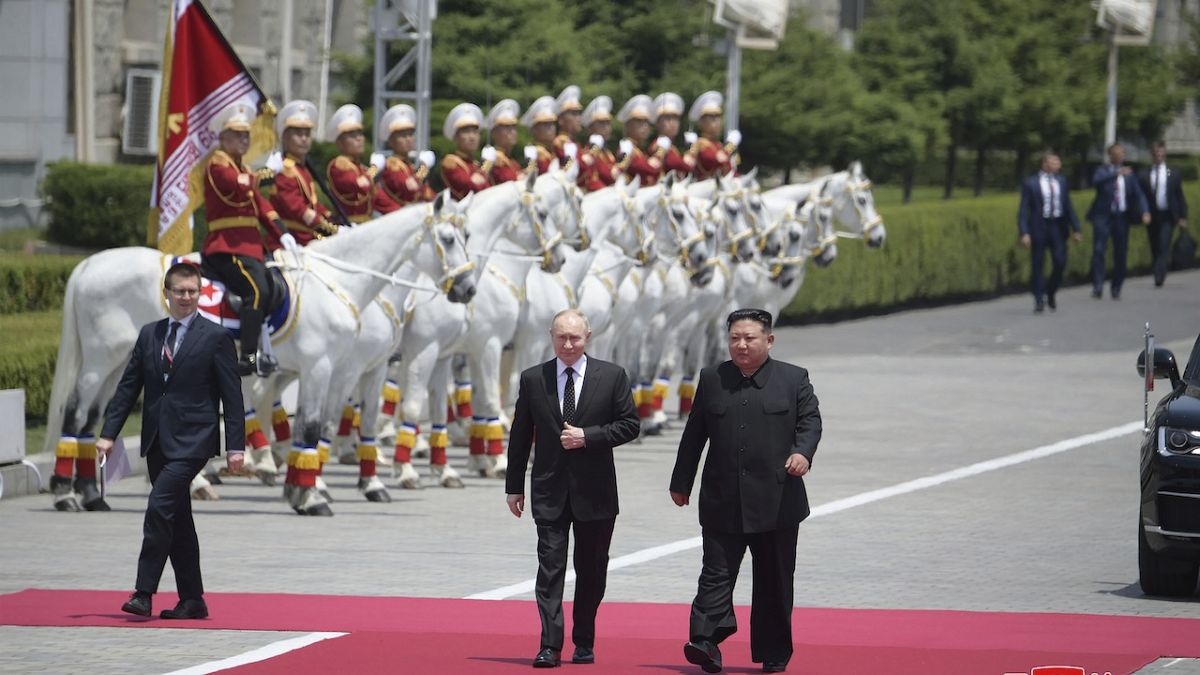Russia contacts isolationist North Korea to gain access to war resources

What are the main reasons why Russia is making its strategic shift to East Asia and even signing a mutual defense pact with North Korea?
Vladimir Putin was given such an impressively staged reception in North Korea that the red carpet on which he was greeted by Kim Jong Un was later seen in satellite images taken from Earth’s orbit.
Economic relations between Russia and North Korea date back to the post-World War II period, when the Soviet Union played a key role in the founding of the Democratic People’s Republic of Korea (DPRK) in 1948.
During the Cold War, the Soviet Union was North Korea’s main economic and military benefactor, providing extensive aid, technical assistance, and trade opportunities. However, with the collapse of the Soviet Union in 1991, this support declined dramatically, posing significant economic challenges for North Korea.
In the 1990s, Russia struggled with its own economic transition and internal turmoil, limiting its imperial ambitions to a regional level, and so paid little attention to North Korea. However, interest revived in the 2000s as Russia sought to reestablish its influence in Northeast Asia. Historical ties and strategic imperatives have since led Moscow and Pyongyang to revive and reshape their economic partnership.
Trade between Russia and North Korea fluctuates, often influenced by international sanctions and diplomatic relations. Trade relations are mainly characterized by North Korean exports of minerals, textiles and agricultural products, while Russia exports energy resources, machinery and transport equipment.
Russia’s radical pivot to China, but also to countries like North Korea or Iran, was a direct result of the Russian invasion of Ukraine. This may not turn out to be a great move by Russian President Vladimir Putin, as Robin Brooks, senior fellow at the Brookings Institute, recently wrote on X: “Russia’s economy is tiny compared to the combined power of Western consumers. You can already see China’s export growth to Russia declining after a brief – and small – boom.”
Yet Putin’s Russia has little choice, having effectively severed its ties with the advanced Western economies and currently pursuing a strategy of open hostility toward its former trading partners.
Maria Shagina, research fellow at the International Institute for Strategic Studies, told Euronews: “After joining the sanctions club, Russia is now forced to deal with North Korea. Moscow and Pyongyang are united in their aversion to US hegemony and their willingness to disregard Western sanctions.”
North Korea, as an isolated island of highly developed totalitarianism, is undoubtedly an excellent partner with which to “trod” the West. Elina Ribakova, director of the International Affairs Program and vice president for foreign policy at the Kyiv School of Economics, told Euronews: “There are absolutely no valid economic reasons for the increasing cooperation between Russia and North Korea, it is purely military cooperation. From an economic point of view, North Korea has very little to offer Russia.”
Branislav Slantchev, a professor at the University of California, San Diego, told Euronews that he also believes that the acquisition of artillery ammunition is one of Russia’s main goals in its close cooperation with North Korea. He added, however, that “guest workers to alleviate the labor shortage in Russia” could also be in Moscow’s interest.
Labor migration is one of the unique facets of Russia-North Korea economic relations. Thousands of North Korean workers are employed in Russia, especially in the Far East, in sectors such as construction, forestry, and agriculture. These workers are an important source of foreign currency for the North Korean regime. However, this aspect of the partnership has drawn international criticism due to concerns about working conditions and potential violation of sanctions.
Energy cooperation is an important aspect of the economic partnership between Russia and North Korea, alongside military cooperation. Russia, which has enormous energy resources, is trying to address North Korea’s chronic energy shortage. Projects such as the possible extension of the Trans-Siberian Railway through North Korea to South Korea and the construction of gas pipelines and power grids underscore the strategic importance of energy cooperation. While these projects face numerous political and logistical hurdles, they represent a long-term vision for regional economic integration.
For Russia, the economic partnership with North Korea is not just about economic benefits; it is closely linked to geopolitical considerations. By working with North Korea, Russia aims to strengthen its influence on the Korean peninsula and provide a counterweight to the presence of the US and its allies in the region. This strategy is in line with Russia’s broader goal of asserting itself as a major player in global geopolitics. As Alexander Clarkson, a lecturer at King’s College London, explained to Euronews: “In this context, it signals to China that Russia can find alternative sources of support, albeit at the risk of angering Beijing at the Putin regime’s disruption of the arrangements on the Korean peninsula.”
The mutual defense pact signed by Putin and Kim is intended as a warning signal for the United States. Ivan Kłyszcz, research fellow at the International Center for Defense and Security in Tallinn, makes a sobering point for Euronews: “Although North Korea is a pariah state, its regime also poses a serious threat to international security. Therefore, its cooperation with Moscow must be taken seriously.”
For North Korea, Russia is an indispensable counterweight to China’s overwhelming influence. While China remains North Korea’s most important ally and economic lifeline, Pyongyang is trying to diversify its international partnerships to avoid over-dependence on Beijing. Russia’s support, both economic and diplomatic, gives North Korea additional leverage in its dealings with China and other international actors.
Alexander Lanoszka, associate professor at the University of Waterloo, explained to Euronews his definition of the recently signed defense pact between Russia and North Korea: “There is a written agreement that contains mutual defense promises. That is an alliance.”
The South Korean presidential office condemned the deal and publicly announced that it would reconsider its current policy of restricting non-lethal weapons support to Ukraine. This shows that Russia’s move to strengthen ties with North Korea has far-reaching regional consequences, with countries like South Korea and Japan bearing the brunt.
While the propaganda scenes from Pyongyang this week may be absurd and at times obscene, Russia and North Korea’s mutual reinforcement of their destructive potential is no laughing matter. This cooperation not only prolongs the war in Ukraine, but also presents a frightening picture of a North Korea with enhanced nuclear strike capabilities.



